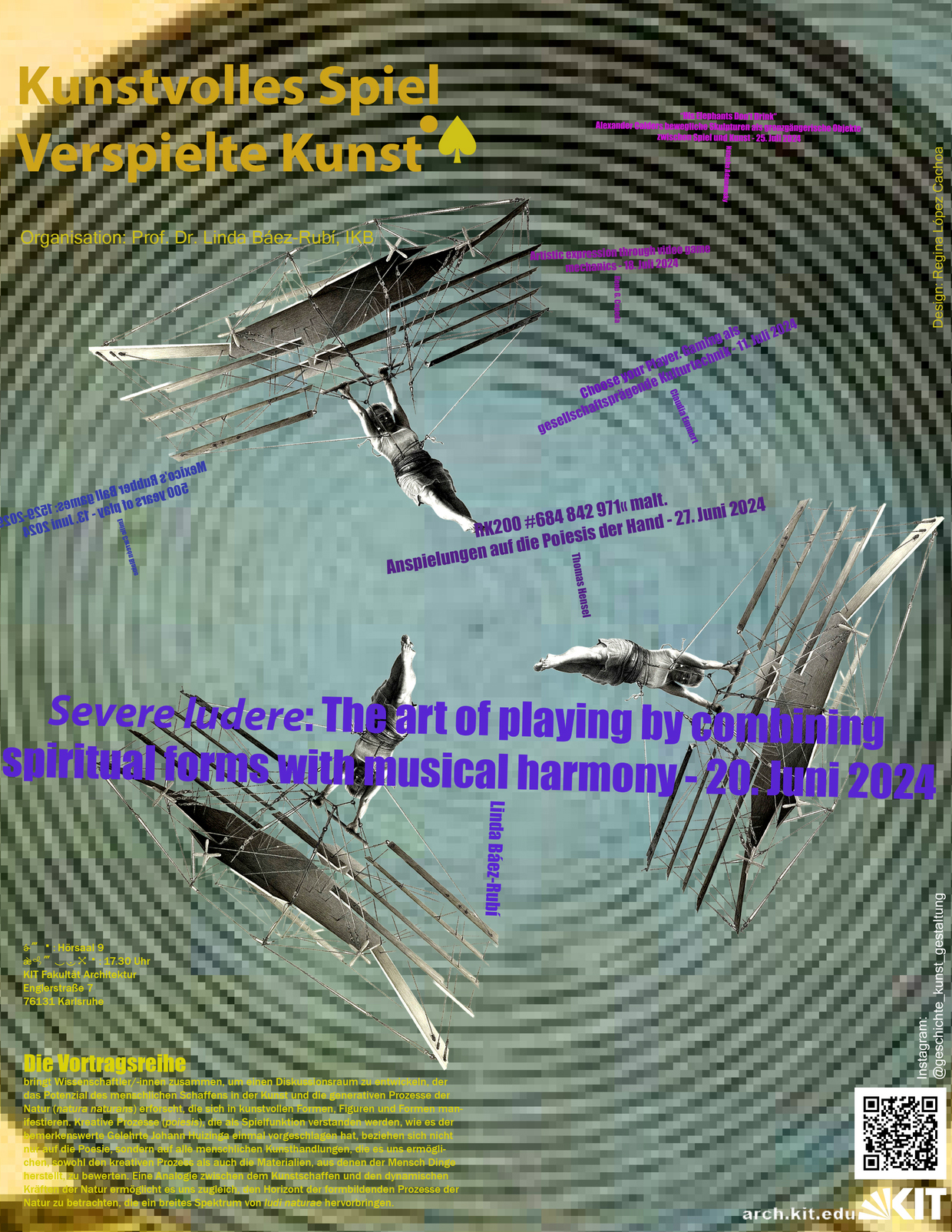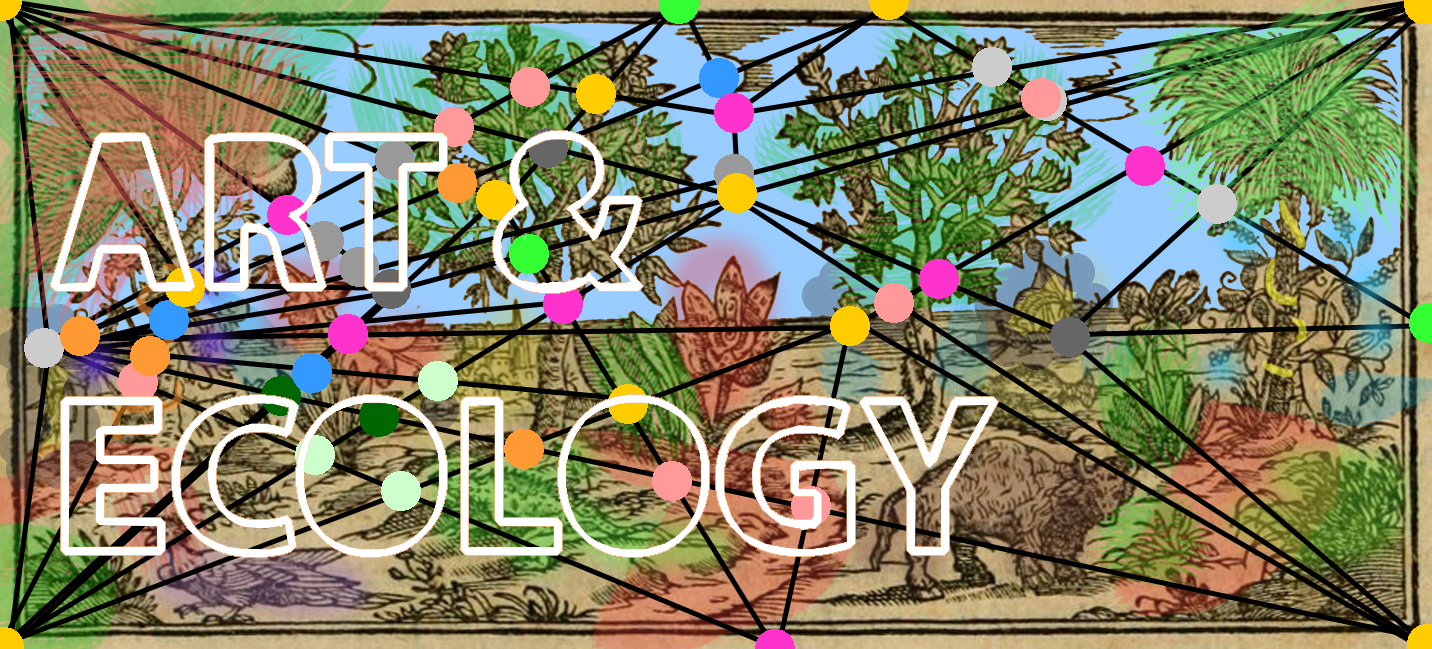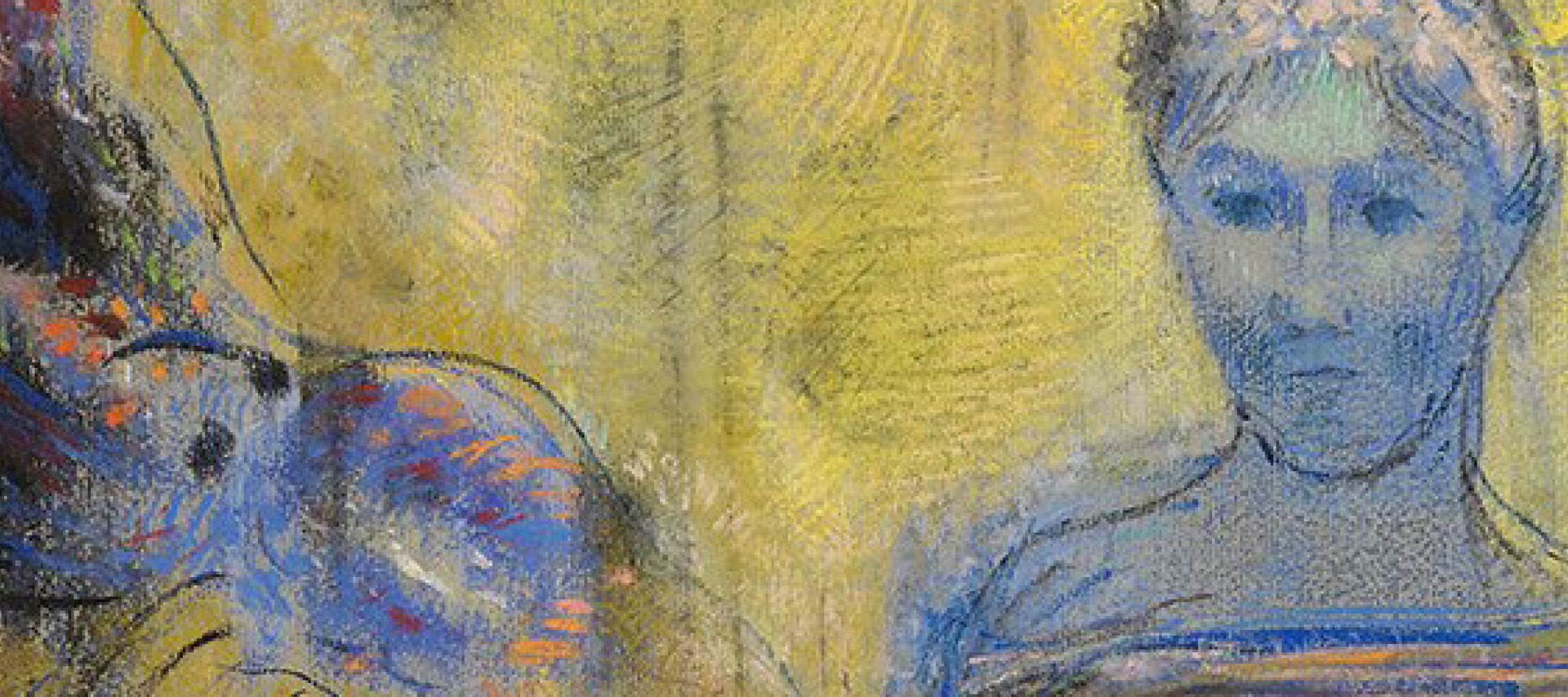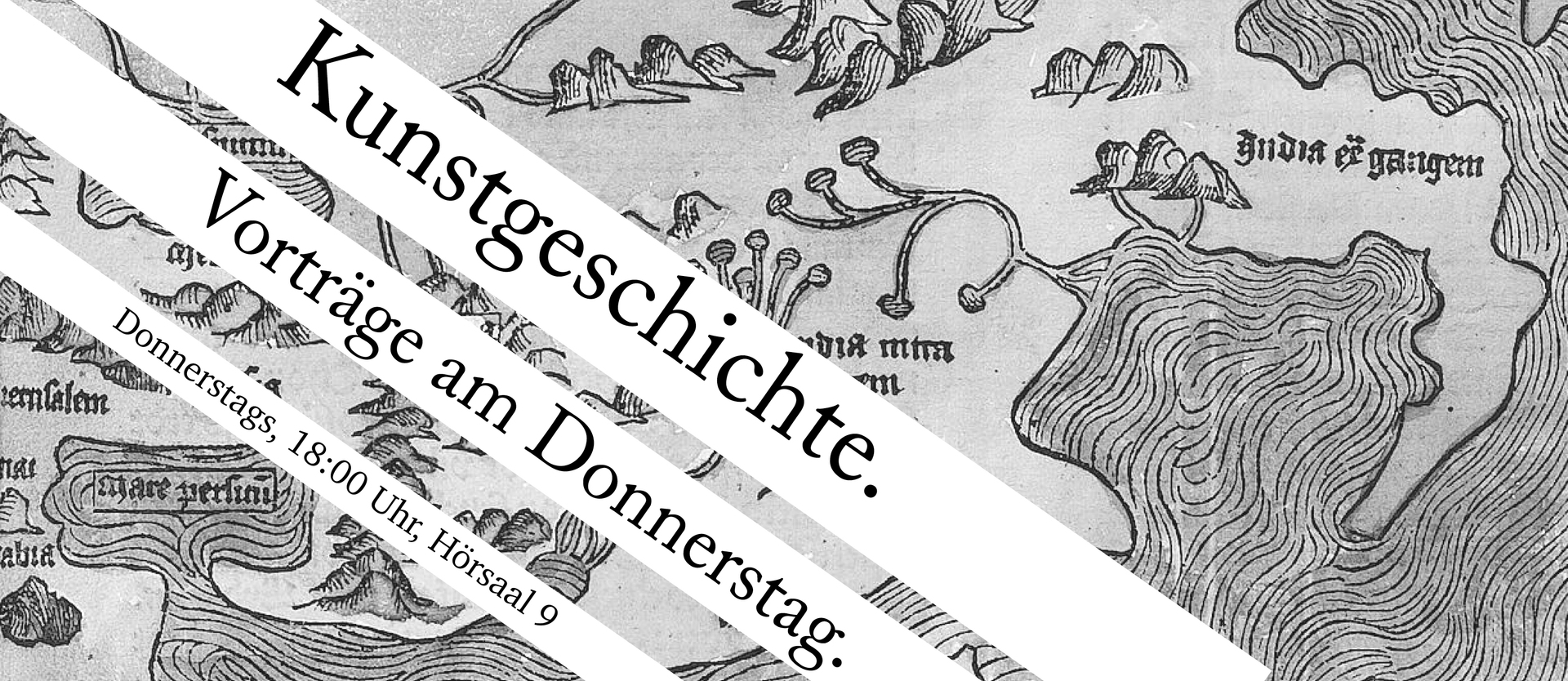Kunstvolles Spiel - Verspielte Kunst | Artful Play - Playful Art

Beginn: 17.30 Uhr
Hörsaal 9, Gebäude 20.40, Architektur
Die Vortragsreihe bringt Wissenschaftlerinnen und Wissenschaftler zusammen, um einen Diskussionsraum zu entwickeln, der das Potenzial des menschlichen Schaffens in der Kunst und die generativen Prozesse der Natur (natura naturans) erforscht, die sich in kunstvollen Formen, Figuren und Formen manifestieren. Kreative Prozesse (poiesis), die als Spielfunktion verstanden werden, wie es der bemerkenswerte Gelehrte Johann Huizinga einmal vorgeschlagen hat, beziehen sich nicht nur auf die Poesie, sondern auf alle menschlichen Kunsthandlungen, die es uns ermöglichen, sowohl den kreativen Prozess als auch die Materialien, aus denen der Mensch Dinge herstellt, zu bewerten. In diesem Zusammenhang ist es notwendig, die poiesis in einem breiteren Kontext zu betrachten, der alle Formen der Schöpfung (fingere) und der Gestaltung (fictio) umfasst. Der Akt des Spielens (ludere) mit Artefakten und Geräten bietet eine Plattform für experimentelles Denken und Komponieren in immersiven Kulturen, die sowohl spirituelle Erfahrung (performative Spiele und religiöse Spiele) als auch Simulation (von magischen Artefakten, die zwischen Spiel und Experiment operieren, bis hin zu Automaten und Computerspielen) umfassen. Eine allgemeine Analogie zwischen dem Kunstschaffen und den dynamischen Kräften der Natur ermöglicht es uns zugleich, den Horizont der formbildenden Prozesse der Natur zu betrachten, die ein breites Spektrum von ludi naturae hervorbringen. Die Erforschung des Phänomens generativer Prozesse und des kreativen Spielens aus einer Vielzahl von Blickwinkeln, Methoden und Fallstudien wird das Feld des kunstvolles Spiels – der verspielten Kunst erheblich erweitern und das Verständnis von bildgebenden Formungsprozessen und die vielfältigen Arten beleuchten, in denen Menschen im Laufe der Geschichte spielerisch mit ihren Geräten und Artefakten in verschiedenen kulturellen Räumen verflochten waren und sind.
The conference series brings together scholars to develop a space of discussion that explores the potential of human making in arts and nature’s generative processes (natura naturans) manifested in artful shapes, figures and forms. Creative processes (poiesis) understood as a play-function as the remarkable scholar Johann Huizinga once proposed, refer not only to poetry but to all human artifice, allowing us to evaluate both the creative process and the materials from which human make things. In this regard, it is necessary to consider poiesis in a broader context, encompassing all forms of creation (fingere) and shaping (fictio). The act of playing (ludere) with artefacts and devices provides a platform for experimental thinking and composition in immersive cultures that encompass both spiritual experience (performative games and religious plays) and simulation (ranging from magical artifacts operating between game and experiment, to automata and computer games). Further, a general analogy between art making and nature’s dynamic forces, enables us at the same time to consider the horizon of nature’s form-forming processes that bring forward a broad spectrum of ludi naturae. To explore the phenomenon of generative processes and creative playing departing from a variety of angles, methodologies, and case studies will significantly broaden the field of artful play - playful art, and will shed light on understanding image making shaping processes and the multiple ways in which humans have been, and continue to be, playfully entangled with their beautiful devices and artefacts across diverse cultural spaces throughout history.
Die Vorträge werden auch online gestreamt. Den Link und den Passcode für das Zoom-Meeting erhalten Sie per Email, bitte wenden Sie sich an helga.lechner∂kit.edu
Termine
|
13 Juni |
Emilie Carreón Blaine |
The contemporary play of a rubbed out game material animation and bouncing balls from Ancient Mexico
|
|
20 Juni |
Linda Báez-Rubí |
Severo ludere: The art of playing by combining spiritual forms with musical tunes.
|
|
27 Juni |
Thomas Hensel |
„RK200 #684 842 971« malt. Anspielungen auf die Poiesis der Hand“
|
|
11 Juli |
Claudia Emmert
|
Choose your Player.
|
|
18 Juli |
René G. Cepeda
|
Artistic expression through video game mechanics
|
|
25 Juli |
Natasha Adamowsky |
“His Elephants Don't Drink.“ Alexander Calders bewegliche Skulpturen als grenzgängerische Objekte zwischen Spiel und Kunst |
Global Perspectives on Art & Ecology II

Die Vortragsreihe "Global Perspectives on Art & Ecology" wird im Sommersemester 2023 fortgesetzt. Die Ursachen der Klimakrise sind in ästhetischen Wahrnehmungen und kulturellen Gewohnheiten verankert, die jahrhundertelang nicht in Frage gestellt wurden. In dieser Vortragsreihe diskutieren Kunst- und Wissenschaftshistoriker, wie solche visuellen und kulturellen Praktiken identifiziert und analysiert werden können, um Kunst als transformative ökologische Kraft zu verstehen. Im Wintersemester 2022-2023 haben die ökokritischen Wissenschaftler Halyna Kohut, Omar Olivares Sandoval, Oliver Hochadel, Nazar Kozak, Jesús Muñoz Morcillo und Sophia Farmer in Fallstudien und Einführungsvorträgen Kernfragen des Diskurses behandelt. Im Sommersemester werden sich Kunsthistoriker:innen wie Peter Krieger, Nazar Kozak und Monica Domínguez Torres mit den Herausforderungen ökokritischer Perspektiven in gegenwärtigen und vergangenen Kontexten beschäftigen, von der frühneuzeitlichen Naturwahrnehmung bis zur heutigen Symbiose von Kunst und Aktivismus.
The series of lectures, "Global Perspectives on Art & Ecology," will continue in the summer semester of 2023. The causes of the climate crisis are rooted in aesthetic perceptions and cultural habits that have not been challenged for centuries. In this lecture series, historians of art and science discuss how such visual and cultural practices can be identified and analyzed to understand art as a transformative ecological force. In the winter semester of 2022-2023, ecocritical scholars Halyna Kohut, Omar Olivares Sandoval, Oliver Hochadel, Nazar Kozak, Jesús Muñoz Morcillo, and Sophia Farmer have addressed core issues in the discourse through case studies and introductive lectures. In the summer semester, art historians such as Peter Krieger, Nazar Kozak, and Monica Domínguez Torres will focus on the challenges of ecocritical perspectives in present and past contexts, from early modern perceptions of nature to today's symbiosis of art and activism.
Bestätigte Vorträge:
27.4.2023
STRATUM – Gegenwartskunst als geo-ästhetische Kritik nicht-nachhaltiger Megastadtentwicklung im Globalen Süden
Peter Krieger, Universidad Nacional Autónoma de México (UNAM)
18.05.2023
Implication: An Ecocritical Dictionary for Art History
Alan C. Braddock, College of William & Mary, University of Virginia
25.05.2023
(Post-)Byzantine Akathistos Cycles and the Natural Word: An Ecocritical (Re)Interpretation
Nazar Kozak, Ethnology Institute of the National Academy of Sciences of Ukraine
15.6.2023
Precious Mutations: Pearls, Critters, and the Order of Nature
Mónica Domínguez Torres, University of Delaware
Ort:
Geb. 20.40 Architektur, Hörsaal 9 (HS9), teils online/hybrid
Link für Zoom-Teilnehmende:
https://kit-lecture.zoom.us/j/64572686671?pwd=bys0N1dmY2tkQm15dDN2N1JYSDFMUT09
Uhrzeit und Termine:
Donnerstags, 17.30 – 19:00 Uhr
Global Perspectives on Art & Ecology

The causes of climate emergency are rooted in aesthetic perceptions and cultural habits that have not been challenged for hundreds of years. In the series of talks titled „Global Perspectives on Art and Ecology,“ art and science historians discuss how to identify such visual and cultural practices and negotiate art as an ecological transformative power. Renowned scholars such as Halyna Kohut (currently visiting research fellow at KIT), Nazar Kozak, and Oliver Hochadel will delve into ecocritical perspectives and art responses to ecological disasters.
3.11.
The Power of Flowers: Сarpets, Nature and Genealogical Myths in the Eighteenth-Century Cossack Hetmanate
Halyna Kohut, Ivan Franko National University of Lviv Ukraine
17.11.
Geoasthetics of the Wasteocene: Contemporary Artistic Research of Mexico City’s Lakes
Omar Olivares Sandoval, Universidad Autónoma de México
01.12.
Animals on the Move. The Global Zoo in the Long Nineteenth Century
Oliver Hochadel, CSIC – Institución Milá y Fontanals (IMF), Barcelona
08.12.
Kenji Yanobe's Atom Suit Project in Chornobyl: An Ecocritical and New Materialist Interpretation
Nazar Kozak, Ethnology Institute of the National Academy of Sciences of Ukraine
The series continues in 2023.
Organized by the IKB – Institute of Art and Building History, Dr. Dr. Jesus Morcillo.
All events will be streamed via Zoom: https://kit-lecture.zoom.us/j/64572686671?pwd=bys0N1dmY2tkQm15dDN2N1JYSDFMUT09
The lecture series in the winter semester 2021/22
TOPOLOGY OF VISUALIZATION
The diversity of objects and practices, of motivations and intentions, of intentions, purposes and addressees of visualization is becoming increasingly unmanageable, as is the multiplicity of its fields of application and impact - from architecture to medicine, from natural science to literature, history and art history. Paradoxically, however, the term "visualization" is usually used indiscriminately for all specific variants, moreover without taking into account the double meaning of visualization as the process and the image product of visualization.
The lecture series Topology of Visualization aims to respond to this persistent and increasing generalization and makes the diversity of visualization as an omnipresent cultural technique the object of investigation itself. The core question is: If there are many visualizations, how do we distinguish them? In four selected heterogeneous disciplinary contexts, the respective understandings, conditions and practices of visualization are addressed in order to locate specific configurations, conditions and comparative parameters that allow for the determination and naming of these different sites of action of visualization.
Organized by Erna Fiorentini.
Institute of Art and Architectural History - IKB at KIT - Karlsruhe Institute of Technology, Department of Architecture
Online, Thursdays 18:00-19:30 h
(1 lecture and 30 min. discussion)
Access data and further information at:
https://kg.ikb.kit.edu/2705.php#block2759
Lectures:
4.11.2021
Visualizing Knowledge: Formen, Forschungsresultate und Fallbeispiele / Visualizing Knowledge: Emergent Forms- Evidence from Research - Examples.
Prof. Dr. Martin Eppler
MCM-HSG Institute for Media and Communication Management
University of St. Gallen (Switzerland)
18.11.2021
Visualisierung für Kultur, Kunst und Medizin / Visualization for Culture,Art and Medicine
J.-Prof. Dr.-Ing. habil. Kai Lawonn Visualization and Explorative Data Analysis Group - Department of Mathematics and Computer Science
Friedrich Schiller University Jena
2.12.2021
Kartographische Visualisierungen und Geschichtswissenschaft: Theoretisch-methodische Überlegungen und empirische Befunde am Beispiel der Flusskartographie im19. Jahrhundert / Cartographic Visualizations in History: Methodological Thoughts and the Example ofRiver Cartography in the 19th Century".
Dr. Nils Bennemann
Institute of History - Department of Humanities
University of Duisburg-Essen
16.12.2021
Visualizing Climate and Climate Change. Historische und gegenwärtige Sichtbarmachungen von Wetterdaten aus bildwissenschaftlicher Sicht / Visualizing climate and climate change. Historical and current visualizations ofweatherdata from an images studies' perspective
Prof. Dr. Birgit Schneider
Professorship for Cultures of Knowledge and Media Environments
University of Potsdam
Lectures in winter semester 2019/20
Art History. Lectures on Thursday
From the screen to the monitor. Moving images in artistic contexts
The lectures take place on Thursdays at 6 p.m.
in lecture hall 9, Englerstraße 7, building 20.40 in Karlsruhe.
14 November 2019
Cultural Postproduction. Museum observations in contemporary video art.
Dr. Stefanie Stallschus (Berlin)
November 21, 2019
Moving and still images of Maria Lessing
Priv.-Doz. Mag. Dr. Edith Futscher (Vienna)
December 12, 2019
Producing together - broadcasting together. Collaboration in the video art of the 1960s and 1970s
Dr. Samantha Schramm (Stuttgart)
January 16, 2020
Hollis Framptons (nostalgia) (1971)
PD Dr. Henning Engelke (Marburg)
30 January 2020
Being Together: Performance and Collaboration in Susan Mogul's Video Works
Prof. Dr. Ulrike Hanstein (Cologne)
Karlsruhe Institute of Technology (KIT),
Institute for Art and Architectural History, Department of Art History The series is supported by the KIT Department of Architecture. http://kg.ikb.kit.edu/
Lectures in the summer semester 2019
Art and Law: "Original, Copy, and Forgery"
Lecture series in cooperation of the IKB (Prof. Dr. Oliver Jehle)
and the ZAR (Prof. Dr. Thomas Dreier)
06 June 2019, 7:00 p.m.
The forged "Sidereus Nuncius" Galileo - Galileis between original, facsimile and forgery
Prof. Dr. Henry KEAZOR (Heidelberg)
27 June 2019, 7:30 p.m.
Deception. Forgery and Plagiarism in the Structure of Aesthetic and Normative Expectations
PD Dr. Dr. Grischka PETR (Bonn)
04 July 2019, 7:00 p.m.
Forms of the Copy - From the Forgery to the Homage
Franziska BRINKMANN, M.A. (Karlsruhe)
11 July 2019, 19:00 hrs.
The crux with the original - a concept and its grey areas in art history and law"
Hubertus BUTIN (Berlin)
18 July 2019, 19:00
Artifact Copy
Dr. Amrei BAHR (Düsseldorf)
The lectures will take place on Thursdays at 19:00/19:30 hrs.
in lecture hall 9, Englerstraße 7, building 20.40 in Karlsruhe.
Admission free.
Conception:
Karlsruhe Institute of Technology (KIT),
Institute for Art and Architectural History, Department of Art History
The series is supported by the KIT Department of Architecture.
kg.ikb.kit.edu
Lectures in winter semester 2018/19

Fig.: Odilon Redon: Female half figure with large flower and profile head (detail), c. 1890.
seeing thinking dreaming
French drawings from the Kunsthalle Karlsruhe
Drawings, with their light and fragile materials, are among the most fascinating works in art history: the artistic techniques and expressive possibilities are inexhaustible.
Drawings are the most immediate form of pictorial production; like no other art form, they create in the viewer a closeness to the imagination and the executing hand of the artist.
In France, since the 17th century, drawing has been academically demanded and practiced as the basis of every art form. Alongside painting, it developed into an independent art genre whose free forms of expression were valued by collectors and discussed in art theory.
The following lectures take place as a cooperation of the Department of Art History with the Staatliche Kunsthalle Karlsruhe in the context of the 150th anniversary of art history at KIT (1868 - 2018).
November 15, 2018
Victor Hugo as a Draftsman
Prof. Dr. Friedrich Weltzien (Hanover)
November 22, 2018
The restorative gaze: Seeing and understanding drawing techniques of French masters
Prof. Dr. Irene Brückle (Stuttgart) and Rebecca Honold (Karlsruhe)
29 November 2018
Ingres, Géricault and Delacroix. Three contemporaneous forms of drawing
Prof. em. Dr. Werner Busch (Berlin)
13 December 2018
L'art des fous and the écriture automatique
Prof. Dr. Oliver Jehle (Karlsruhe)
January 10, 2019
Pastel: drawing or painting?
Prof. Dr. Carolin Meister (Karlsruhe) and Dr. Astrid Reuter (Karlsruhe)
Concept
Karlsruhe Institute of Technology (KIT)
Institute for Art and Architectural History
Department of Art History
https://kg.ikb.kit.edu/
Location: Staatliche Kunsthalle Karlsruhe(kunsthalle-karlsruhe.de), Feuerbach Hall
in each case 19:00 o'clock
free admission
Lectures in the summer semester 2018
Of making visible and becoming visible
What is intended when something is to be made visible? How does this process work? What becomes visible in the end, and how? Does anything become visible at all? And if not, why?
The talks at IKB in the summer semester 2018 aim to reflect on these questions about the connection between intention, form and effect of visualization(s) from different disciplinary perspectives.
The focus is on the concepts, practices and cultures of illusion, simulation and deduction, and the absence of visibility.
On Making Visible and Getting Visible
What is intended, when something should be made visible? How does this process happen? What gets visible eventually, and how? Does something get visible at all? And if not, why?
The conversations at IKB in Summer Term 2018 reflect these questions about the interdependence of intention, form and agency of visualization(s) from different disciplinary vantage points.
The discussion will focus on concepts, practices and cultures of illusion, simulation, deduction and absence of visibility.
3.5.2018
Relationship theatre: optical architectures and the matter of res extensa
Ulrike Haß (Institute for Theatre Studies, Ruhr University Bochum)
14.6.2018
Making Invisible in the History of Scientific Visualization
Omar Nasim (Chair for the History of Science, University of Regensburg)
28.6.2018 (New date)
The Aesthetics of Obscurity: Unearthing state violence as a counter-forensic practice
Stefanos Levidis (Forensic Architecture, Goldsmiths, London)
12.7.2018
Limited vision: what dioramas show
Alexander Gall (Deutsches Museum, Munich)
19.7.2018
"Am I in?" Visibility and invisibility in simulation and immersion
Claus Pias (Institute for Culture and Aesthetics of Digital Media-ICAM, Leuphana University Lüneburg)
Concept
Institute for Art and Architectural History
Department of Art History
Prof. i.V. Dr. Dr. Erna Fiorentini
https://kg.ikb.kit.edu/
Thursdays, 18:00
Department of Architecture
Lecture Hall 9
Building 20.40
Englerstrasse 7
76131 Karlsruhe
Lectures in winter semester 2017/18
In the lecture series Curatorial Studies, curators from various museums and institutions present their projects and activities. The series focuses on the museum as a field of work and future strategies for the development of visitor-oriented exhibitions.
02.11.17
How to become a curator of contemporary art in 10 steps. An instruction manual
Dr. Frank-Thorsten Moll
Director ikob Eupen (Belgium)
09.11.17
Prof. Dr. Barbara Welzel
Institute for Cultural Studies Essen
Seminar for Art and Art Studies,TU Dortmund
16.11.17
Art without Caviar. Curating in the Province
Dr. Velten Wagner
Director Museum and Cultural Officeof the city of Engen
07.12.17
Panel discussion on the exhibitionCézanne. Metamorphoses(28.10.2017–11.02.2018)
with Dr. Alexander Eiling (curator 19th-21st c.),Dr. Sibylle Brosi (Head of Art Education)and Florian Trott (press officer),Staatliche Kunsthalle Karlsruhe
25.01.18
Participatory museum work at the Historisches Museum Frankfurt
Dr. Angela Jannelli
Curator Historical MuseumFrankfurt on the Main
01.02.18
Mediation as curatorial practice
Daniela Bystron, M. A.,
Research Assistant,National Museums in Berlin, HamburgerBahnhof - Museum for Contemporary Art
Conception:
Institute for the History of Art and Architecture
Department of Art History
Prof. Dr. Oliver Jehle
Dr. Alice Anna Klaassen
Thursdays, 18:00
Department of Architecture
Lecture Hall 9
Building 20.40
Englerstrasse 7
76131 Karlsruhe
Lectures in the summer semester 2017

01.06.17
Focus on one of the most famous incunabula: Hartmann Schedel's Liber chronicarum
PD Dr. Dipl.-Ing. Christoph Reske (Mainz)
29.06.17
Asianist aesthetics and transcultural translation in the work of Agnes Martin
Dr. Mona Schieren (Bremen)
06.07.17
The gaze of the "Good European": Harry Graf Kessler and art around 1900
Prof. Dr. Alexandre Kostka (Strasbourg)
20.07.17
Success or failure of the Christian image in the service of 'spiritual conquest'? The Cult of the Virgin of Guadalupe in the 'New World'.
Dr. Raphaéle Preisinger (Bern)
Institute History of Art and Architecture
Department of Art History
Englerstrasse 7
D-76131 Karlsruhe
Website of theDepartment of Art History
Lectures in winter semester 2016/17
03.11.16
"The cultivated shabbiness of the trueborn Englishman".
Francis Bacon's spatial construction and the aesthetic concept of "Englishness".
Prof. Dr. Friedrich Weltzien (Hanover)
10.11.16
On the Afterlife of Reliquaries: Material Negotiations of the English Reformation
Dr. Christiane Hille (Munich)
24.11.16
Bodies in Sheaths. On the agency of love offerings at the English court around 1600
PD Dr. Marianne Koos (Fribourg)
08.12.16
Art, Technology, Naturalness around 1800
Dr. Jan von Brevern (Berlin )
15.12.16
Allegory as a Reversal Machine.
Anthonis Van Dyck paints Lady Venetia Digby
Prof. Dr. Karin Leonhard (Constance)
19.01.17
John Constable's Perspective Studies
Dr. Iris Wien (Berlin)
26.01.17
Füßli's "Nachtmahr". A Pathos Formula and its Consequences
Prof. Dr. Werner Busch (Berlin)
02.02.17
Potentials of Bad Weather
English landscape painting in the 19th century
Prof. Dr. Monika Wagner (Hamburg)
09.02.17
"It was a Madness to have his Prints".
The Rise and Dominance of English Prints and the Role of Rembrandt
Dr. Peter Scholz (State Gallery, Stuttgart)
Institute of Art and Architectural History
Department of Art History
Englerstrasse 7
D-76131 Karlsruhe
Website of the Department of Art History



